Baptist Union Council: March 2022
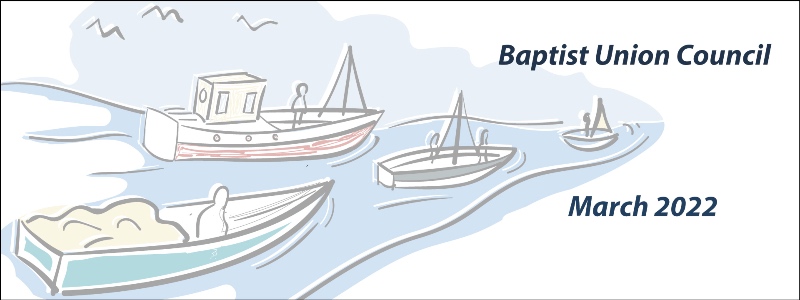
Around 70 people gathered at the Hayes Conference Centre in Swanwick, Derbyshire for the latest Baptist Union Council. There were three key items on the Council agenda, alongside the usual finance, pensions, new and closed churches, and Key Roles Nominations updates.
These were: an application from St Hild’s College to become a member of the Baptist Union of Great Britain; the consideration of a change to the Ministerial Recognition Rules relating to what they say about marriage; and the first stage of the financial model review. A series of proposals relating to Ultimate Trusts was also considered.
On Tuesday evening, we had a live prayer broadcast, where there was a focus on Ukraine.
Worship was led by Clare Hooper, a regional minister at Southern Counties Baptist Association with a particular remit to support churches and pioneers in their mission with children, young people and families. Through a series of videos, Clare, who is also a member of the Children, Young People and Families Round Table, frequently brought the voice of the child into proceedings.
Communion was shared as the gathering closed early on Wednesday afternoon, led by Vice President Hayley Young.
Scroll down for the following reports:
-
St Hild College application
-
Ministerial Recognition Rules - Marriage
-
Financial Model Review
-
Ultimate Trusts
-
Key Roles Nominations
-
Finance and pensions
-
New churches and church closures
-
Live prayer broadcast
‘Reflecting on last week’s Council meeting I noticed that there were many positive aspects of our time together,’ said General Secretary Lynn Green, ‘including creativity and worship, grace-filled listening, friendship renewed, laughter shared, and heartfelt intercession.
‘But it was also a time when we wrestled with some very difficult issues. There was honesty, there was difference and there was pain. The light and the shade were held before God as we shared communion together; the Body of Christ broken for us, the blood of Christ poured out for us.
‘I am praying that in the midst of all this we will continue to fix our eyes on Jesus, seek His Kingdom and grow more fully into the fruit of the Spirit, trusting that the Lord will hold us and lead us through.’
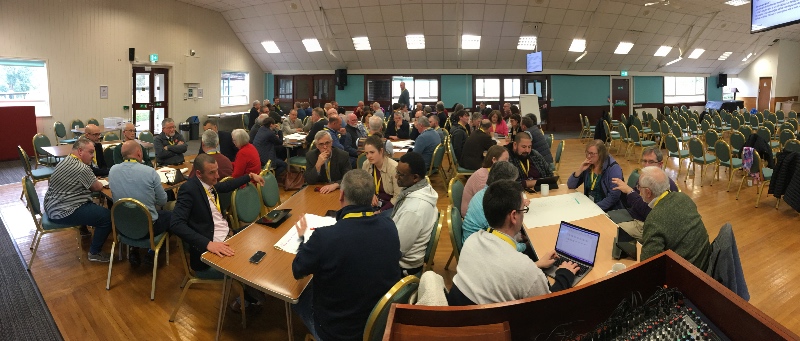
St Hild College application 
Council members narrowly voted to refuse an application that St Hild College be formally welcomed into membership of the Baptist Union of Great Britain, and thereby become an accredited Baptist training college.
This was the first application for membership of a Baptist college since the inception of the current Union. There are five Baptist colleges in active relationship which predate the current Union.
After an at times passionately argued two sessions, Council members voted 35 against, 29 for, with five abstentions.
The application was submitted by the Trustees and Directors of the Yorkshire Baptist Association (YBA) and East Midland Baptist Association (EMBA), and Council members were informed of strong support both for and against the application.
The agenda papers included letters of support from YBA and EMBA representatives and Baptist ministers in the two Associations, including Peter Morden, a former vice principal at Spurgeon’s College and now Senior Pastor of Cornerstone Baptist Church in Leeds.
By contrast, representatives of Northern Baptist College, Cardiff Baptist College, Bristol Baptist College and Spurgeon’s College all wrote to explain why the application should be turned down, as did Stuart Davison, Team Leader of the South Eastern Baptist Association.
At the last Council gathering in October, members were informed of the application, and notice was given of a fuller conversation to be held at Council in March 2022 with a view to a decision.
Council members had to consider:
-
What is a Baptist College?
-
How far St Hild may be considered to be a Baptist College.
-
The implications of another College entering the training of Baptist ministers for existing provision and future provision.
-
The proposition that there is a regional emphasis to the work of St Hild in ministerial training.
St Hild College has been working with local Baptist churches and Associations since 2013 (first with the launch of St Barnabas Theological Centre, and since January 2017 as St Hild College). While providing training and formation for people from a wide array of Christian traditions, the main stakeholders at the college are from the Anglican and Baptist traditions.
Since 2014 St Hild has worked in partnership with Northern Baptist College (NBC) to train and form Baptist ministers. Since that time it has trained 15 ministers, plus a further 27 students recruited directly by St Hild from local Baptist churches. However, the training offered as a hub of NBC is ‘limited in our view by its dual-oversight and limited suitability for flexible missional training’, the application stated.
YBA and EMBA recommended St Hild for membership of the Union, ‘on the basis that the training and commendation of candidates for Baptist ministry is delegated to this Centre, and in the expectation that any participation in the national life of BUGB be undertaken by that Centre.’
They highlighted their rationale for the proposal:
-
to enable a step change in training for ministry in our region, in order to address the fragility and decline of many of our Baptist congregations. This new initiative seeks:
-
to significantly increase the number of younger leaders
-
to recruit and train church planters and church planting teams
-
to develop new training pathways for pioneers
-
to develop an effective missional pathway for new leaders that is fully aligned with the work of the St Hild Centre for Church Planting
-
to address the shortfall of ministers training and offering to settle in the North
-
to offer more flexible and accessible Baptist training routes which can widen the reach of Baptist training and stem the loss of Baptists to non-denominational alternatives
-
to develop engagement with local Baptist churches
After consultation with local churches in YBA/EMBA, there was ‘significant support’ for a localised Baptist presence.
‘We see in this proposal an urgent and timely gospel partnership which can make a significant strategic contribution to the life of Baptist churches in our region,’ the application stated.
Alex Harris, the Director of Baptist Church Planting at St Hild, Principal Mark Powley, and YBA and EMBA Regional Minister Team Leaders Graham Ensor and Mark Clay, all spoke to Council in support of the application.
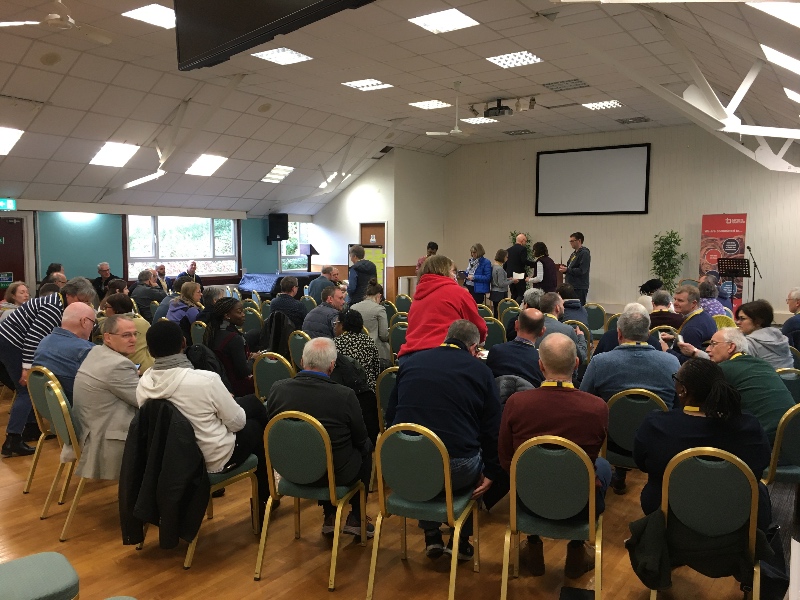
Collecting the votes on the St Hild application
Council members were presented with a paper from Northern Baptist College setting out its concerns. The paper explained that Baptist ministers in training at St Barnabas / St Hild have been based in Sheffield where they have pursued academic courses validated by Durham Common Awards. NBC has retained responsibility among other things, for admissions, placements, tutorial support, wider formation, and commendation into settlement.
Following ‘the early success of our partnership with St Barnabas / St Hild,’ NBC has extended this hub model. It now has similar partnerships with Cranmer Hall in Durham and The Light College which operates nationally but is based in Cheshire.
Its concerns about the proposal were:
Will the proposed new centre for Baptist ministry be a truly Baptist college? While the proposal to restructure St Hild to include a centre for Baptist Ministry seeks to safeguard Baptist identity, the centre will still be subject to the authority of the St Hild trustees.
Is the duplication of provision and the consequent spreading of resources wise? Duplication of provision means spreading our resources more thinly. The number of nationally accredited ministers in our denomination and the number of ministers in training is declining. Each of the Baptist colleges is to one degree or another constrained financially.
Would the fragmentation of an already small cohort of ministers in training be detrimental to the formation process?
Might the creation of a new independent college pose a threat to the existence of both NBC and Luther King Centre? ‘The creation of a new independent Baptist College forty miles away is likely to have a significant numerical and financial impact on NBC and therefore on Luther King Centre, which would risk ‘harming the work of the kingdom.’
The letters from Cardiff, Bristol and Spurgeon’s College praised the quality of course offered at St Hild, but all questioned the need for it to become a Baptist college. Each echoed similar concerns about financing and Baptist identity. There was concern too that a successful application from St Hild could set a precedent and lead to applications from other colleges or college departments, and lead to a further dilution of Baptist students.
NBC Co-principal Glen Marshall addressed Council, while a number of other Baptist college Principals were present and contributed to the discussion. The two sessions were chaired by Martin Hodson, General Director of the Baptist Union of Scotland, and included table discussion and plenary alongside the presentations. The voting took place by secret ballot.
Ministerial Recognition Rules - Marriage
Council members considered a request to revise an example of gross misconduct of the Ministerial Recognition Rules.
The specific clause (Appendix 3, Section 4.3) under consideration says:
‘Sexual Misconduct which brings the church and ministry into disrepute. NB This specifically includes sexual intercourse and other genital sexual activity outside of marriage (as defined exclusively as between a man and a woman).’
The request is that the last section in brackets is removed, which would mean that a minister who is in a same-sex marriage would no longer be committing gross misconduct and lose their accreditation.
The request was received in a letter signed by 70 people who are part of Baptists Together, the majority of whom are ministers. The Council agenda paper said the letter highlighted ‘the divergence of practice between the ability of a minister to preside at a same sex marriage where the covenant with church takes priority – and the inability of a minister to enter a same sex marriage where the covenant with the Union takes priority.’ Consequently, the paper continued, 'a church which is supportive of same sex marriage is unable to call an accredited minister who has chosen to enter a faithful, lifelong, sexual, covenant relationship with someone of the same sex.' In addition, the authors of the letter raised the serious matter of the harm experienced by the LGBTQ+ community, which they state is compounded by the current rules.
Council members were informed there was no intention to make any decision at this gathering.
Instead, the intention now was to:
-
Consider together scriptural and theological understandings around marriage held by individuals and churches within Baptists Together.
-
Listen carefully and respectfully to individuals who are directly affected by this example of gross misconduct and any change to it.
-
Consider the implications of the Declaration of Principle on how we determine the conduct required of men and women accredited by the Baptist Union regarding marriage.
-
Identify who else we need to hear from before making any decision at a future meeting of Council.
The agenda paper stated that central to any consideration of the request are two questions:
-
What we believe Christ through scripture and the guidance of the Spirit reveals to us about marriage and whether it is possible for Christian marriage to take place between two people of the same gender?
-
To what extent can or should Council through the MR Rules prioritise one understanding of marriage held by some churches over that held by other churches within Baptists Together?
'There is much which has been written from many perspectives about same-sex orientation and relationships in light of the Bible, tradition, theology, and the scientific knowledge and understanding available to us now,' the paper continued. 'It is abundantly clear that these are complex issues, over which there is disagreement.'
To help consider the first of these questions, a paper was commissioned which sought to explore the biblical basis and theology that underpin understandings of Christian marriage (this paper was asked to be brief and to convey the range of views), and a video conversation recorded exploring how we understand and interpret scripture, and what happens when we disagree about difficult issues.
The sessions took place on Tuesday afternoon and Wednesday morning, and were led by Sian Murray-Williams, the moderator of the Ministerial Recognition Committee (MRC).
‘We all know these matters are complex,’ said Sian. ‘Feelings run deep, and each of us is seeking to be faithful to Christ.’
She encouraged Council members to listen well, and expressed her hope that the shaping of the sessions would enable ‘good discernment to happen.’
Council members were invited to talk together on tables and share, via differently coloured post it notes, what we can endorse (green); what are our questions (orange); and what has new insight (blue). The notes were displayed on boards around the room, and will be typed up to enable further prayerful reflection.
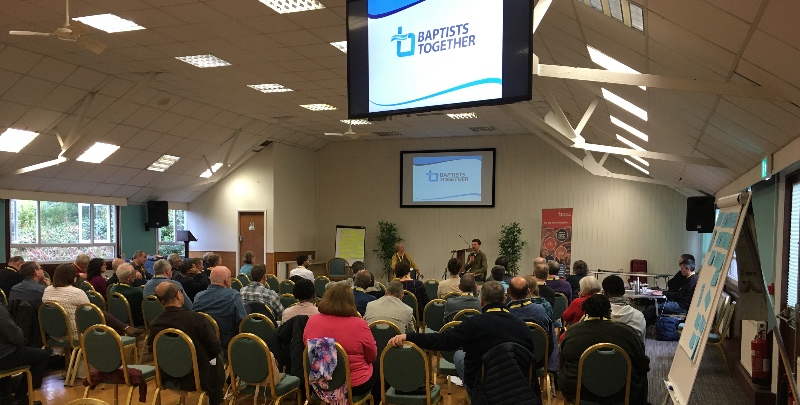 A significant part of the first session was set aside to hear from four people who each brought their own perspective to the current example in the Rules and the requested change. This was conducted in individual conversations with Sian.
A significant part of the first session was set aside to hear from four people who each brought their own perspective to the current example in the Rules and the requested change. This was conducted in individual conversations with Sian.
Council heard from Luke Dowding whose marital status means his longstanding sense of call to Baptist ministry is closed; from Pam Davies, who couldn’t in good conscience remain accredited while ministering to members of the LGBTQ+ community in a pioneering setting; from Andy Fitchet, a minister who would like to be free to marry and remain accredited; and a minister who is gay, holds a conservative view and believes he is called to a celibate life. Two of the interviews were live, two recorded.
The intention was for Council members to reflect on what they’d heard overnight.
Wednesday saw a focus on our Declaration of Principle. Council members once again gathered around tables and were asked to discuss four questions:
-
How does the Declaration of Principle work in this process?
-
What are the respective responsibilities of the Union and the Churches in this decision and how do they interact?
-
How do we listen to carefully to all views?
-
How do we handle difference?
-
A plenary session closed proceedings, in which members were invited to share their views with everyone.
A number of concerns were raised: some said they couldn’t endorse something that contradicted their understanding of marriage; and voiced their fears of a fall out among some churches if the change is made. While the local church is free to discern the mind of Christ on whether to register its building for same-sex marriage, accreditation is from the centre: therefore if the change is made, some stated, the Baptist Union would be changing its view on marriage. Another commented that our churches are not in an affirming position, and we have a lot of work to do to prepare for healthy discussion.
It was noted others hold different interpretations, and that the Declaration of Principle is a gift which can hold us together. There were calls to find out in more detail what local churches are saying, and a request for more conservative views to be shared to aid reflection. There was also a comment that Council hadn’t heard the theology of homosexuality.
The comments indicated ‘the depth of feeling,’ said Sian, ‘and everybody’s desire to get it right.’
She said ultimately the question is: is there space at the table for those who think differently than me? Is there space in the Baptist family for those who think same sex marriage is ok?
The request will now return to the Ministerial Recognition Committee, which will reflect on the listening so far and plan appropriate next steps.
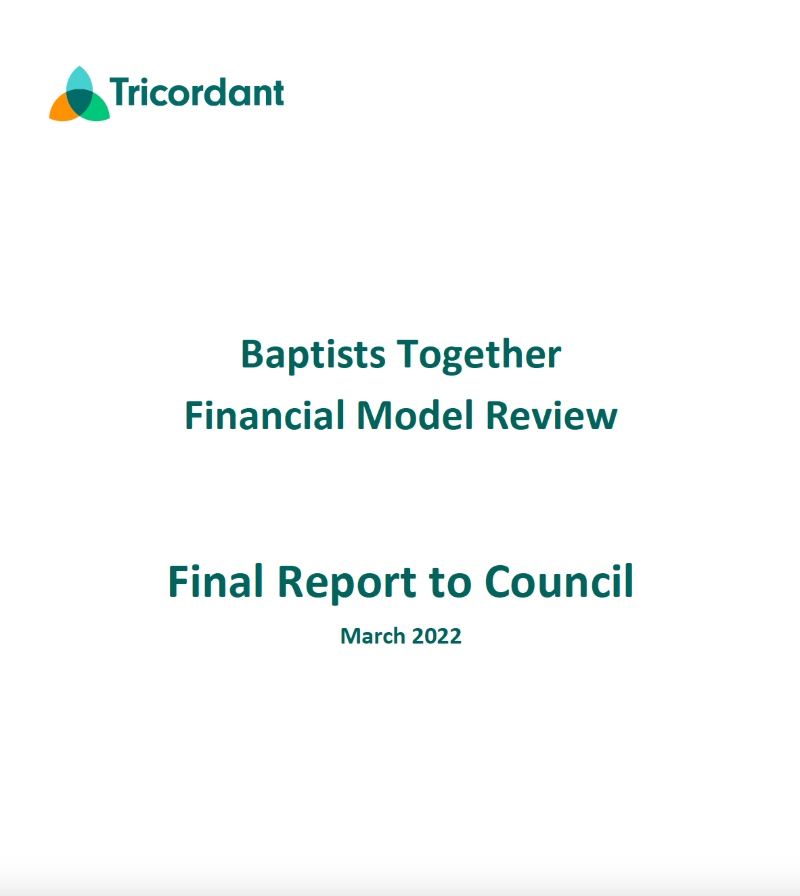 Financial Model Review
Financial Model Review
A series of recommendations relating to increased clarity and agreement on how the various elements of Baptists Together can collaborate for individual and collective benefit, and the consideration of alternative financial models for raising and distributing funds, was approved by Baptist Union Council.
The three recommendations were offered in the first phase of the Financial Model Review, in a report by the independent consulting practice Tricordant.
Our declining income along with continued tensions as to whether the current system is fair led to Council initiating this review. Tricordant was commissioned through a competitive procurement last summer.
This first phase was a listening exercise, with Tricordant gathering perspectives from a wide range of stakeholders, including Regional Associations (RMTL, Treasurer, Moderator, Trustee), Mission & Pioneer groups, Specialist Team Leaders, BUGB Trustees, BUGB Finance & Audit Committee, BUGB Treasurers, Chair of Ministerial Formation Funding Group and Colleges. The aim was “to help make sense of where things are at.”
Tricordant’s John Taylor spoke about some of the report’s findings, sharing its five headline messages and speaking on how we work together, income generation and communication.
The headline messages are:
-
Baptists Together is a complex adaptive system and it is important to understand the dynamics of such a system, how it operates and the impact and consequences of decisions and actions by any part of the system on another part.
-
A lack of agreement and subsequent clarity of the nature, purpose, identity, and leadership of Baptists Together/BUGB alongside the complex system issues including roles and accountabilities, has led to what, in our view, can best be described as a fudge. There are underlying issues of power, trust, and to some extent fear, despite the good intent of everyone in the system.
-
The Baptist movement has a great history and tradition; however, it faces the challenge of how to move into the future with a range of generational, theological, and ecclesiological differences.
-
The principle of family sharing and the common purse is at the heart of the current financial model and the review examines areas relating to how well this does and does not work along with areas where the principle may be undermined.
-
The understanding and awareness of the Home Mission Fund is a mystery to many, primarily due to poor communication and a potential misnomer i.e., ‘Mission’ in what is largely a fund to deliver administrative support services.
Though the first three headlines are not directly related to the financial model review, ‘they are important for the context in which the review operates,’ the report stated, ‘and will have potential implications for any future decisions on amendments to the financial model.’
The plan at the time of initiating the review was for three further phases of work – development of options, refinement and agreement, and implementation. But given its findings, Tricordant offered three recommendations, to be actioned sequentially as soon as possible.
They are:
Recommendation 1
Undertake an externally facilitated process to identify and agree across Baptists Together how the various elements of Associations, Specialist Teams, BUC, and Colleges can work in close collaboration as system partners for individual and collective benefit. This to include clarifying roles, accountabilities and core functions of Associations, Specialist Teams and Colleges all documented in a Memorandum of Understanding.
Recommendation 2
Explore and agree collaborative actions for optimising spend on certain services including their organisation and delivery, for example through a shared service model.
Recommendation 3
Consider alternative financial models for raising and distributing funds which include maintaining a set of core principles to be defined [such as being just, fair, efficient, consistent, and responsive to changing circumstances] as well as enabling Associations to raise funds directly. This would include re-visiting the issue of subscriptions with a fresh perspective.
Council members were told the three recommendations are supported by the Core Leadership Team and Trustees, and were invited to discuss at tables how to respond to them.
All three recommendations were approved, with a small number of abstentions.
John said there is ‘much to consider’, with ‘real issues and challenges for Baptists Together that must be faced.’
Nevertheless, change is possible. Though there are different viewpoints, there is a real desire to work together, he said. ‘Working with you has been a pleasure. I’ve met some incredible people doing this piece of work.
‘You CAN do this. You have the ability and the desire.’
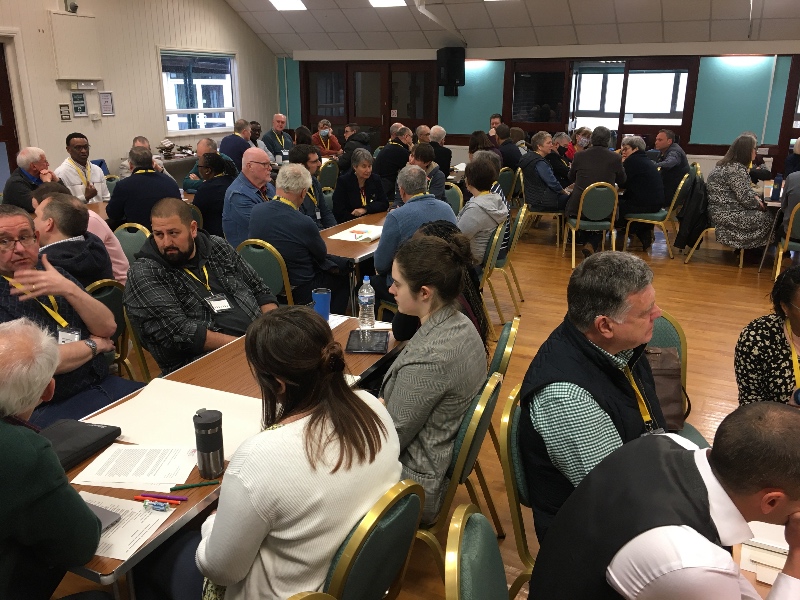
Ultimate Trusts
Proposals relating to Ultimate Trust were presented to Council for feedback.
Ultimate Trusts are usually set out in the foundation deeds of a church and state how funds from the church are to be used following closure. They can be likened to wills, said a paper summarising the issues. An Ultimate Trust Sub Group was created following the October 2020 Council in light of the uneven priorities and distribution of the funds.
Most of our churches have ultimate trusts which benefit one of the following:
-
The Baptist Union
-
A local Baptist Association
-
Baptist Building Fund/CIO
-
Particular Baptist Fund
Treasurer John Levick introduced the session, stating the group only considered Trusts where the Baptist Union were the ultimate beneficiaries. Baptist Union Council agreed many years ago that ultimate trust funds coming to the Baptist Union would be shared with the Association where the closed church was located. The current split is 50:50 or 60:40.
He reminded Council that Ultimate Trusts are an inheritance from local churches for local mission. It would be good to use funds for capital projects, particularly pioneer work; and investment in future generations such as housing for pioneers or student training.
The paper summarised the problems with the current arrangements. These included:
Church closures are arbitrary. The majority tend to be rural or large village/small town locations. The changing industrial landscape, especially in the north and Wales also has an impact.
Associations which have or had a Trust Company tend to be beneficiaries of ultimate trusts in their Association. Those with Trust Companies tend to be towards the north and west of England, but also London. Associations which have never had Trust Companies tend to be towards the South and East of England, but also South Wales. Some Trust Companies encourage churches to declare ultimate trusts in favour of the Association.
It is not mandatory to adopt model trusts so churches near closure may decide to benefit the local association rather than BUGB. This is particularly the case where the Association has its own Trust Corporation.
Associations see ultimate trust funds enabling them to balance their budgets even though some have significant reserves and can therefore afford to run deficits.
Ultimate Trusts are an inheritance from past generations. At the moment much of the inheritance is going into current spending. We are spending the family silver. What resources are we leaving for future generations?
The sub-group considered a range of proposals including doing nothing, all funds going to Associations and all going to BUGB.
It brought the following recommendations:
-
A priority is to reinvest in property, in particular to provide housing. This could be for pioneers, churches appointing a minister for the first time and not having a manse or CYF ministers/workers. This both meets current need but protects the capital for the future.
-
The principle to be applied in managing these funds is to: a. Set priorities collectively and b. Implement locally
-
There are other needs which warrant funding which are investments for the future, but require current funding, such as funding for ministry.
-
It is recognised that some Associations will need funding for ongoing needs.
-
A matrix to be adopted which allows funding of a number of streams, but on a more focused basis. Population of the matrix is to be set by Council in percentage terms and revised from time to time
Around tables, Council members were asked to discuss the pros, cons and any issues of these proposals.
John stressed that the paper was an interim report, and that the final outcomes need to dovetail with the finance considerations.
The following resolution was unanimously agreed: The Ultimate Trusts Subgroup will continue developing proposals on the use of ultimate trusts taking account of feedback from Council, working with the Finance Review group, to bring back firm proposals to a future Council on the use of ultimate trust funds received by the Baptist Union of Great Britain.
Key Roles Nominations
Council members voted to support a recommendation that the next moderator of the Baptist Union of Great Britain Trustee Board will receive a £10,000 annual honorarium payment.
The suggestion was made by the Key Roles Nominations Committee in light of the ongoing struggle to find someone with the capacity to fulfil the role. Rupert Lazar, who chairs the committee, said 'it's a big role that's getting bigger and bigger'. The feedback received during the recruitment process has shown the time commitment - around three to four days a month - was putting off suitable candidates. He explained that an honorarium is not a wage, and could serve as an incentive to release someone.
There was general support for the principle, with some saying other organisations take a similar approach, alongside some concern about the proposal.
The recommendation was carried with six abstentions and one vote against.
Council members also voted to approve the recommendation that Jeniya Gwendu serves as a Trustee for three years. Jeniya is married to Gilson, who is the Minister at Cranbrook Baptist Church. From 2014, she served as a trustee for the Eastern Baptist Association for five years and then became the Association’s Moderator for two years.
In October 2021, I completed the “Equip to Minister” course at Spurgeon’s College and I am now awaiting a date to meet with the Ministerial Recognition Committee. ‘Jeniya is a wonderful lady, quiet, quite shy, a very Godly and able lady,’ said Rupert.
Rupert also acknowledged and thanked Christina Carter, who has completed her time as a trustee having served two terms.
Council also approved the recommendation that Andrew Cowley extends his trustee term until the October 2022 Council. Andrew is currently serving as interim moderator.
Rupert reminded Council that we continue to search for a successor to treasurer John Levick. John’s name will be taken to Assembly to serve another one year term as our Union's treasurer, which will be his final one before standing down in 2023.
Council members were encouraged to continue to feed names to the Key Roles Committee.
Finance and pensions
Support Services Team Leader Richard Wilson gave a finance update. 2021 was not a bad one for our Union, but was skewed by two substantial legacies. ‘Take that out and the picture doesn’t look great,’ Richard said. The operating surplus on the Home Mission Fund for 2021 is £142k. The Home Mission Appeal was behind budget by £197k and £63k worse than 2020.
The pension scheme performance is going very well, Richard added - it continues to track ahead of the Recovery Plan. The estimated liability on a buyout basis (which assumes that an insurance company is paid to take on all the risk of paying pensions) has fallen significantly in the last six months, meaning we are perhaps only a couple of years away from being able to complete a buyout.
Planning for a buyout is ongoing. Currently, a buyout could not be implemented due to the structure of the benefits in the scheme so we are developing proposals to amend the benefits supported by Anthony Collins Solicitors and actuarial advisors XPS. The next step is to put a formal proposal to the Pension Scheme. We hope to consult scheme members on the proposals later in 2022.
Funding for Ministerial Training Working Group: Following on from the last Council, BUGB Trustees agreed to set aside £200k of funding for a pilot of the new Student Training Loan Scheme, Council members were informed. The funds have come from a part of the un-used funds in the Coronavirus fund that were unspent when the grant scheme wound up at the end of 2021. The pilot will provide loan support to the cohort of students starting in autumn 2022.
We are now working with Kingdom Bank on detailed processes to operate the scheme. We have also engaged with Stewardship around using their recipient accounts to allow ministers-in-training to raise finance from individual supporters and churches.
New churches and church closures
A new number of churches were welcomed into membership of our Baptist Union. They are:
-
Living Word Christian Fellowship (LB)
-
Emmanuel, Swanage (SCBA) (church also in membership of the Old Baptist Union)
-
Love Purfleet (EBA) (Subject to EBA Trustees meeting on 19 March)
-
Maranatha Romanian Baptist Church (CBA)
Three churches ceased membership of BUGB:
-
Hattersley Baptist Church (NWBA) (church remaining in membership with Old Baptist Union)
-
Ambleside (NWBA)
-
Caversham Park LEP, Reading (SCBA) (church becoming a member of the URC only)
Five closures were announced:
-
Oasis, Hove (SEBA)
-
Fleet Meadow, Didcot (SCBA)
-
Upper Chalke Valley Church (SCBA)
-
Thorverton (SWBA)
-
East Boldre Baptist Church (SCBA)
Council members were also informed that three churches have changed their name.
-
From: Tabernacle Baptist Church To: New Hope Church (SWaBA)
-
From: Leigh Beck Baptist Church To: Canvey Island Baptist Church (EBA)
-
From: Osmaston Road Baptist Church To: Derby Urban Church (EMBA)
‘Let’s give thanks for all these churches,’ said Council moderator Seidel Abel Boanerges. ‘Let’s remember the impact these closed churches had on the communities.’ Seidel then prayed for each church.
Praying for Ukraine
A live prayer broadcast took place on Tuesday evening, with a focus on Ukraine. This was led by General Secretary Lynn Green and our Public Issues Enabler Steve Tinning, and can be replayed below:
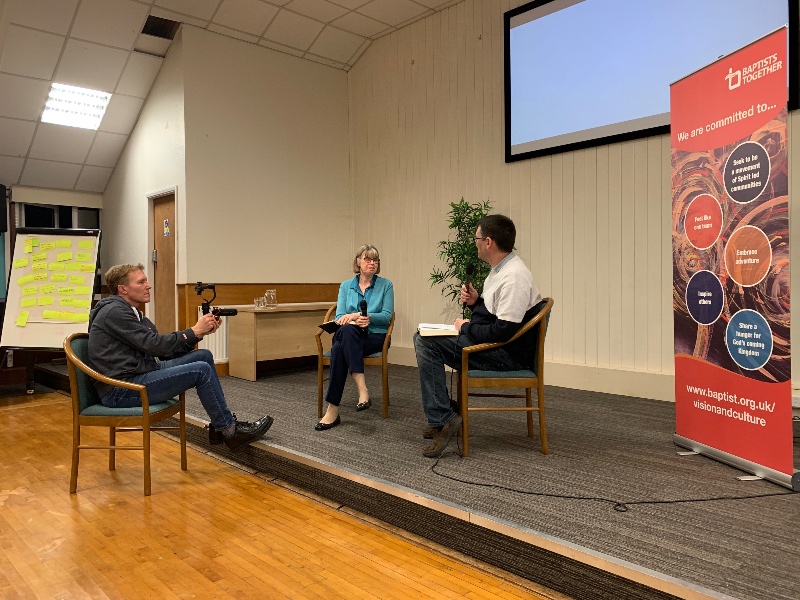
Do you have a view? Share your thoughts via our letters' page.
Baptist Times, 05/04/2022